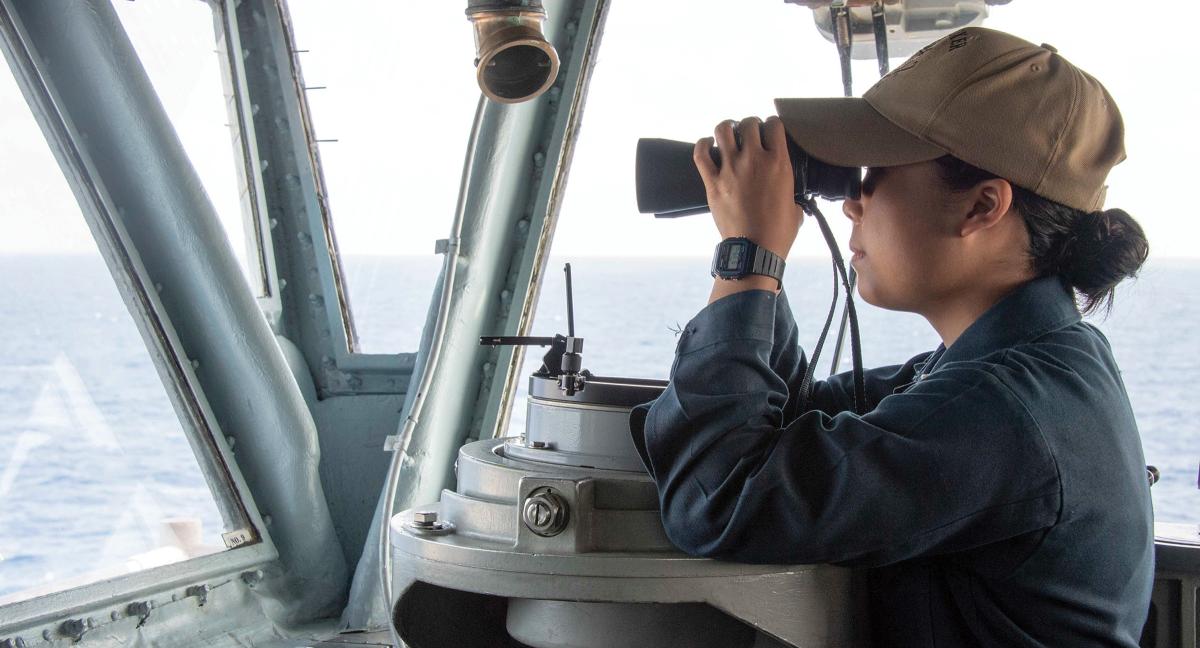As a surface warfare officer (SWO) in the Navy, I have spent my share of time in qualification boards, both on the side answering the questions and on the side asking them. Boards are a mainstay in shipboard culture, and for SWOs in particular, they are a rite of passage. Ultimately, they are how we are tested before assuming crucial watch stations on board our ships, watches in which we hold sailors’ lives in our hands. Given our adherence to on-the-job training, the inconsistency of the board system for SWOs is a problem that needs addressing.
Generally, a board is the final step in the personnel qualification standard (PQS) for any major watch station.1 Though boards are meant to measure officers’ abilities in conjunction with PQS, it is a widely held belief within the surface navy that the “line items” on any PQS do not constitute the requisite knowledge to assume that watch station. Instead, board members, be they the ships’ captains or any combination of more senior officers, routinely come up with new questions and create their own standard.
At the heart of the problem is that lack of standardization. First, boards are arbitrarily assembled. Who is responsible, for example, for vetting an officer’s knowledge of the International Regulations for Preventing Collisions at Sea? The ship’s navigator? The captain? Department heads? Every ship does it differently.
Second, boards vary greatly in length, format, and difficulty. My officer of the deck (OOD) board lasted no more than an hour and was not particularly difficult. Others last three times that, while some captains qualify their junior officers without a formal board.
This system puts too much power in the hands of individual wardrooms. What the Navy needs instead is to create a single standard that all ships rely on to ensure officers are properly qualified across the Navy.
Boards, as currently administered, are an unreliable gauge of an officer’s knowledge or skill. Because the questions are arbitrary, the knowledge being tested can be less important than the way a junior officer responds. In the Navy, we have a word for this: boardsmanship. This term doesn’t mean an officer has demonstrated competency for a particular qualification, rather, it means having a poker face equates with doing well at a board.
How can the Navy create professionalism in its officer corps if there is no agreement on what is asked in, say, a SWO board? In other words, what exactly does the Navy want its officers to know?
As an example of what such a standard might look like, consider the surface force of the Royal Navy. Its “warfare officers,” the equivalent of SWOs, spend months honing mariner skills at the Royal Navy College. Once on a ship, they log hundreds of hours of supervised watch on the bridge without the added burden of being in charge of a division. Finally, they complete advanced navigation and seamanship training and are formally assessed in accordance with the International Maritime Organization’s Standards of Training, Certification, and Watchkeeping (STCW). Once they complete their officer of the watch qualification, similar to the U.S. Navy’s OOD letter, they still must earn a platform endorsement for a specific ship class from their commanding officers before taking charge on the bridge.
Recent incidents in the surface navy have made clear the need for formal, standardized training for SWOs. A haphazard approach that asks junior officers random questions while seated at wardroom tables is no way to qualify anyone to stand watch on the bridge or in the engineering plant. The Navy has taken a small step recently by extending training at the division officer level, but this is not enough. We must change our habits and our culture on board ships as well.
1. For insight into the shortcomings of PQS, see CDR Brooke Millard, USCG, and MCPO Paul Kingsbury, USN (Ret.), “The Shipboard Personnel Qualification Standard Is No Longer Effective,” U.S. Naval Institute Proceedings 145, no. 8 (August 2019), and PO2 Bryan Black, USN, “Personal Qualifications Erode Sailors’ Integrity,” U.S. Naval Institute Proceedings 145, no. 10 (October 2019).





